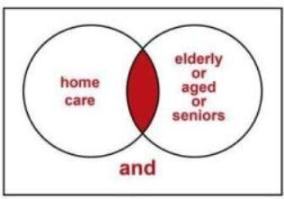Unlike public search engines such as Google, library databases usually find only exactly what you ask for. Therefore, you need to use some specific search techniques, which are generally available in most databases.

- home care and (elderly or aged or seniors)
- This will find publications dealing with home care of the elderly, even if the document uses the word aged or seniors instead of elderly. In the diagram on the right, each circle represents a concept, and the area where the circles overlap represents the search results, or “hits.” Many databases also allow use of the not operator, which will exclude concepts, as in this example:
- home care not plumbing
- Some databases use the plus sign + instead of the word and, or in order to force an exact word search,
as well as the minus sign - instead of not to exclude terms. - Subject Headings/Descriptors
- In addition to searching by keywords, you should consider using each database’s preferred subject terms, sometimes called subject headings or descriptors. For example, the sociology indexing database, Sociological Abstracts, prefers the term elderly, while the library catalogues prefer aged or older people. Using the proper subject terms will help to ensure you get all the relevant publications in the database, and will also prevent you from getting irrelevant hits. Some databases have an online thesaurus which contains the subject terms, while others allow you to browse and select subject terms.
- Truncation *
- Truncation is the process of abbreviating or shortening a keyword to its stem in order to retrieve all possible word variations. Most databases will let you find variations of a word using a wildcard symbol, usually an asterisk (although the Quest catalogue requires the symbol). For example, typing gerontolog* would retrieve gerontology, gerontological, etc. But be careful not to truncate a word too far. Typing ger* would also get you information on geraniums, germs, and Germans.
- Exact Phrase Searching “ ”
- It has been assumed in the above examples that a database will search home care as a phrase, and not as two separate keywords. However, some databases (e.g., those provided by EBSCO) would automatically put an invisible and between the words, and require double quotation marks around phrases (e.g., “home care”).
- Field Searching/Limiting
- Field searching is used to specify the type of keyword you are entering. For example, a person may be searched as a subject, rather than as an author, by clicking or selecting “subject.”
CHAT is closed.
CHAT is away.
CHAT is busy.
CHAT requires JavaScript.